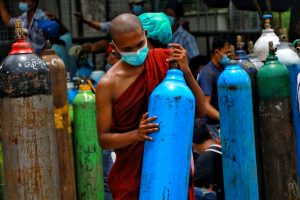Since the military coup in Myanmar in February of this year, fears have grown that the country is becoming a failed state, or even sliding into all-out anarchy. While the murderous junta has certainly tried its best to drive the country to the brink of ruin, the fact is that it has not been able to do so. Myanmar is not a failed state, but a failed coup – thanks to the resourceful and resilient people of the country.
Across Myanmar, an almost parallel state has emerged, comprised of a broad coalition of democratic forces. This network provides healthcare, safety, and other vital services in the vacuum left by the illegal junta over the past six months. With a deadly wave of COVID-19 ravaging the country, it is crucial that the international community works with the National Unity Government (NUG) and other actors who are trying to save lives.
The global attention on Myanmar since the coup has been welcome, including headlines highlighting how at least 936 people have been killed by the junta and many thousands detained arbitrarily. Myanmar is now faced with a spiraling third wave of COVID-19, which the junta has weaponized by hoarding medical supplies for itself and its cronies and denying treatment to those who do not support it.
This is where Myanmar’s brave pro-democracy movement has stepped in. This movement has blossomed from workers’ strikes, peaceful protests, and boycotts of military-owned businesses into de facto state organs serving the people where the Tatmadaw will not.
What has emerged is a decentralized web of local responders, ethnic service providers, civil society organizations, humanitarian actors and groups aligned with the NUG and Civil Disobedience Movement. This network, held together by the common thread of building a democratic, inclusive Myanmar, is fighting to ensure the provision of vital services and life-saving humanitarian aid for millions of people.
Committed residents have formed their own local administrative committees, shutting out the junta and planting the seeds of a new democracy. These parallel civilian structures operate in many important ways: former government health workers have volunteered at mobile and underground clinics, at the risk of their lives, while ethnic administrations are enrolling new students in primary schools. They are also distributing aid to the displaced in Chin, Karenni, Kachin, Shan, and other states.
We should not underestimate the scale of the problems. Millions face food shortages and hundreds of thousands have fled the junta’s brutality, cut off from food, water and medical supplies in the mountains and jungles. Others have sought refuge across Myanmar’s borders. In this context, the third wave of COVID-19 is bringing the country to its knees.
However, despite the damage already done, it is wrong to assume that is only a matter of time before Myanmar joins the wretched list of failed states. If Myanmar becomes a failed state it will only be because the international community failed to come to its aid.
The international community has a significant role to play, not least in ensuring that Myanmar does not become a forgotten crisis. Last week the Special Advisory Council for Myanmar, of which we are the founding members, called for an urgent humanitarian intervention, mandated by the United Nations Security Council, to support the desperate battle against COVID-19.
The international community must recognize the NUG as the legitimate representatives of the people of Myanmar and work with it to get medical supplies and health professionals to the areas most in need. The Tatmadaw has hoarded medical supplies, underreported case numbers, and even seized the oxygen that the sick and vulnerable need to breathe. Their impunity must end, and they must be held to account for decades of atrocities – and certainly not allowed to lead any COVID-19 response.
The world must support the democratic movement holding the country together. The NUG and ethnic health organizations have formed a COVID-19 Task Force, with which the international community must now engage. For decades, ethnic service providers, civil society groups, and humanitarian actors have used their own well-established systems in the border states to get life-saving humanitarian aid to people who need it. Food, water, cash, medical supplies, and COVID-19 vaccines must be directed through the COVID-19 Task Force to these networks.
The cooperation of neighboring States – Bangladesh, China, India, Laos, and Thailand – will be essential to enable humanitarian supplies to cross their borders into Myanmar. That is the kind of international help that is needed, not the sale of more arms by Russia to the junta.
Another important moment will come in September, when the U.N.’s credentialing committee will decide on who will represent Myanmar at the body. The current ambassador to the U.N., Kyaw Moe Tun, has emerged as a powerful pro-democracy voice on the world stage since the coup. The U.N. must recognize the NUG as the legitimate representatives of the people of Myanmar before the U.N. General Assembly meets. Opting for a junta-appointed representative would be a betrayal to the people of Myanmar and legitimize military horror.
We strongly believe that when Myanmar’s history is written, it will be not of a failed state, but of a failed coup. The world must now do everything to make this a reality.

































